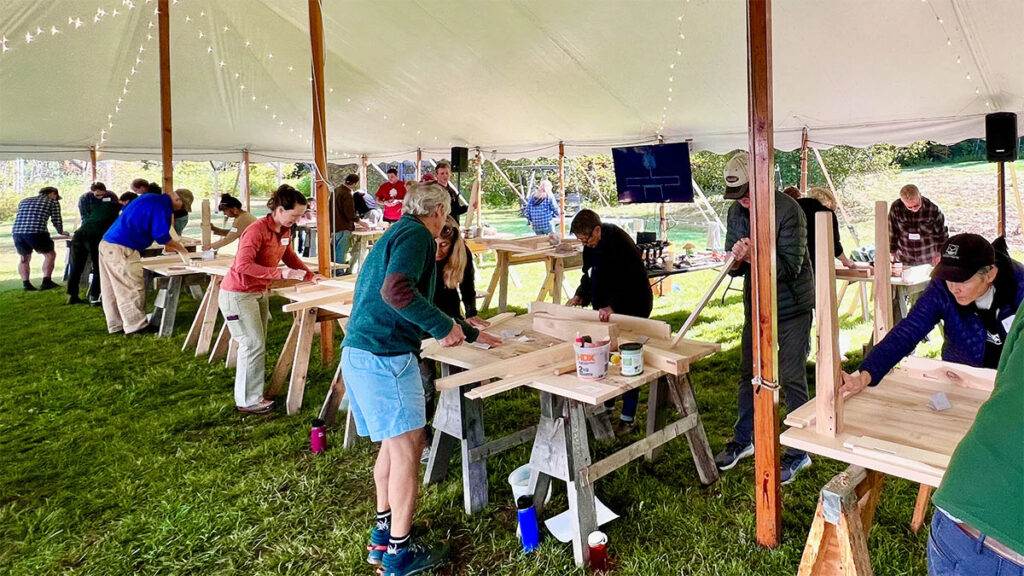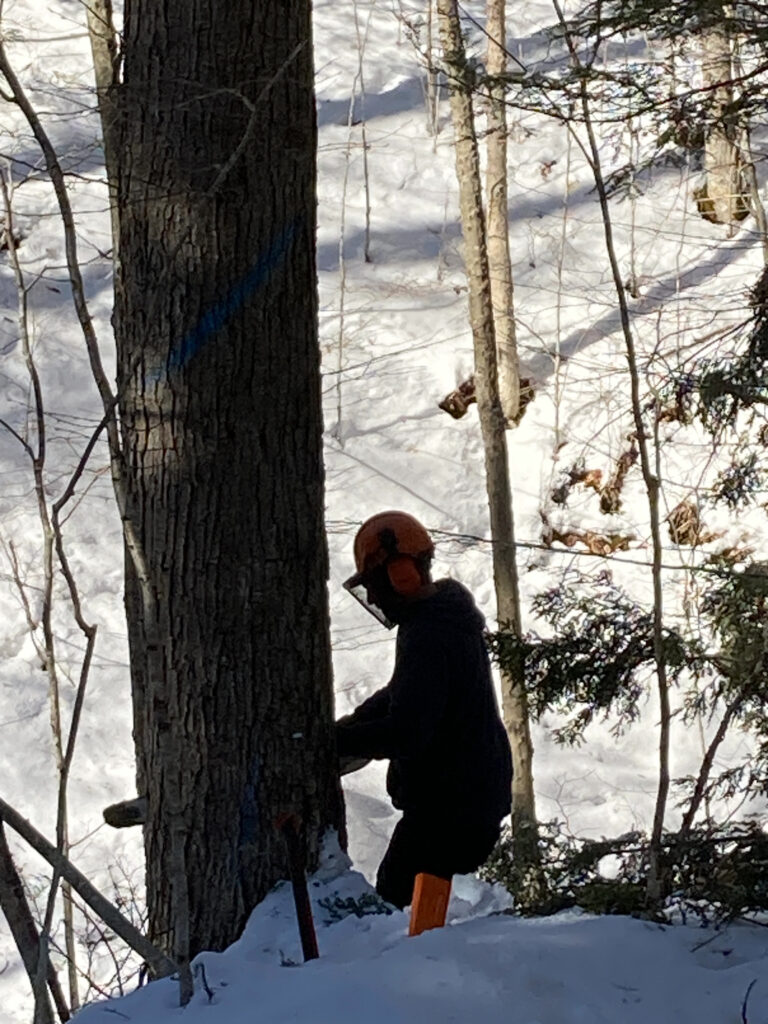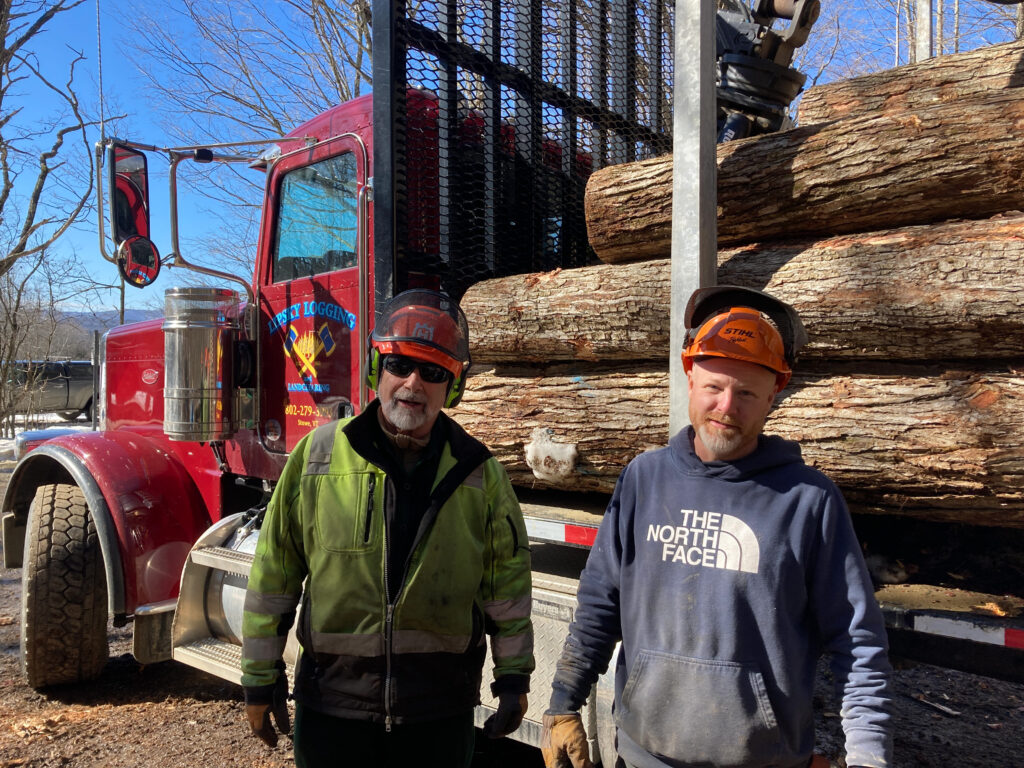By Kathleen Wanner
It’s a small world! When you hear that today, it usually has a global connotation. Not so for The Naked Table Project, the brainchild of Charles Shackleton, a furniture maker from Bridgewater. Naked Table highlights just how small the footprint of forestry and wood products can be.
Naked Table grew from the seed of an idea in response to a challenge by Sustainable Woodstock about 15 years ago. Since its founding in 2009, Shackleton has hosted more than 20 Naked Table events.
Now, the State House lawn will be the backdrop for the next Naked Table on June 1. Charlie Shackleton has set a goal of 20 Vermont maple dining tables made by participants at a cost of $2,500 each. Profits from this event will benefit Habitat for Humanity, which expands the “tree to table” concept to highlight Vermont’s housing challenges.
Naked Table is a supply chain story that requires a lot of local players and partners working together to ensure success; it’s a sometimes circuitous journey and always begins on the land, in a managed forest.
This particular Naked Table starts on a Tree Farm in Washington County owned by Senator Patrick Leahy and his wife, Marcelle. In addition to being staunch supporters of Vermont’s forest sector, the Leahys have managed their 139 acre woodlot as a Certified Tree Farm since 1995. The management pillars of Tree Farm are fourfold: wood, water, wildlife, and recreation. The Leahys Tree Farm ticks all boxes, thanks to a long history of stewardship and guidance from consulting foresters. Allan Thompson is the current consulting forester, having taken over forest management about three years ago. As a licensed consulting forester, he helps to ensure that forest stewardship on the property meets the high standards of both the Leahys and the Vermont Tree Farm, a program of the Vermont Woodlands Association. The harvest planned for the property was perfect timing for this year’s Naked Table and the Leahys were excited to be involved in a project that contributes to healthy forests and the forest economy.
Thompson credits the Leahys for years of exemplary care that allowed for good forest growth and increased timber value.
This particular harvest had two components. A “whole-tree harvest” was done by Tom Lincoln and a smaller area was logged by Ivan Ainsworth using a cable skidder. Pine, softwoods, and hardwoods were sent to area mills; firewood fed the residential market; and Lincoln’s woodchips were sent to Burlington Electric’s McNeil Generating Station. A truckload of soft maple from the skidder harvest was delivered by Jed Lipsky, a master logger, trucker, and legislator from Stowe to Gagnon Lumber in Pittsford for milling and drying.
From landowner to forester to logger to trucker to mill to kiln to woodworker, good communication was the key to successful transitions. Charlie Shackleton knew the dimension lumber he needed to craft 20 tables. Prior to the harvest, Thompson assessed the mature maple timber to ensure that trees cut for forest health would fulfill the needs of Naked Table. Once felled, Ainsworth needed to segregate those logs for trucking to the mill and Lipsky had to deliver.
Ken Gagnon had the list of lumber to be sawn from that truckload. It too was segregated at the mill so that Gagnon could run that job on its own, about a morning’s work. A few years ago, Gagnon would have trucked this lumber to Massachusetts for kiln drying. However, a Working Lands Grant allowed Gagnon Lumber to install three-phase power to the mill and it now operates its own kiln.
It takes a certain size mill to do this kind of custom work — not too big and not too small. Gagnon Lumber generally saws about 2 million board feet a year, a medium size mill for Vermont. Typically, the mill will saw the same species for a week or more, optimize for best output, sort, and send to kiln. This job was just about 3,000 board feet and although it takes a little more work and some preplanning, Gagnon was able to ensure that the soft maple logs from the Leahy property made the journey from tree to lumber. Naked Table participants will close the loop to finished table.
Charlie Shackleton was born in Dublin, Ireland, and raised in a Quaker family that ran a multigenerational flour mill since 1776. He loved the outdoors; he loved creating. From a young age he was making castles from Legos that soon morphed into treehouses from wood. Rather than attending university, he found his niche at art school in England, in the woodshop where he could let his hands do the work. There he met Miranda Thomas, the potter, who would become his wife.
In 1981, Charlie Shackleton came to America at the urging of his friend and mentor, Simon Pearce. During his first five years in Vermont, he was a glassblower in Simon Pearce’s Mill. While it was handwork it wasn’t wood! With Pearce’s encouragement, he set up a furniture workshop in his basement. Fastforward 40 years and he’s still at his woodshop, ShackletonThomas, at the Bridgewater Mill where he and a small group of master craftspeople continue to handcraft furniture and other wood products.

Participants at a past Naked Table event build their own maple tables during the workshop.

Ivan Ainsworth fells a sugar maple tree during the winter harvest.
Shackleton finds that he can express his love of nature through wood. And he can satisfy another passion too: that is, connecting people to the forest and to each other. Naked Table has become a centerpiece that allows him to combine his love of woodworking, his artistic vision, and his desire to build community around the concepts of family, food, sustainability, and philanthropy. The partnership with Habitat for Humanity has reinforced his desire to create products and processes that strengthen broader communities.
In 1981, Charlie Shackleton came to America at the urging of his friend and mentor Simon Pearce. During his first five years in Vermont, he was a glassblower in Simon Pearce’s Mill.
On June 1, the State House lawn will be transformed into a woodworking shop under a big tent. Participants in Naked Table will be working with Charlie and his master craftspeople to build their own maple dining tables, tables that will last lifetimes and carry stories through generations. The Naked Table event will culminate in a locavore meal provided by Cloud Nine Caterers and served around the 20 newly crafted tables.

Jed Lipsky and Ivan Ainsworth take a break on the landing after loading a log truck with soft maple sawlogs.
The event, hosted by the Naked Table Project, is held in conjunction with Vermont Woodlands Association supporting Central Vermont Habitat for Humanity. The event is made possible thanks to the support of many organizations and individuals that work to support various aspects of the forest and wood products sector, including Vermont Wood Works Council, Guild of VT Furnituremakers, and a bipartisan group of legislators, who will be building a table that will live in the Vermont State House.
For more information visit: nakedtable.com.




